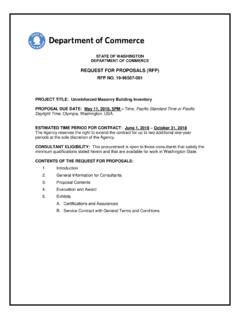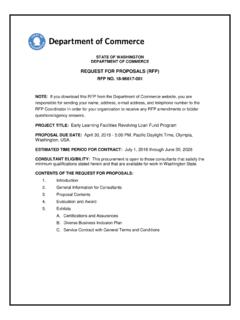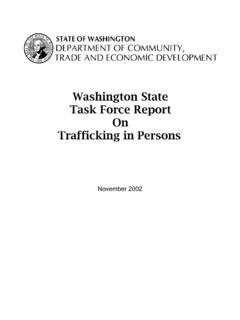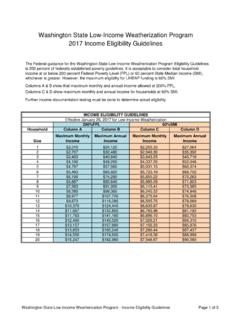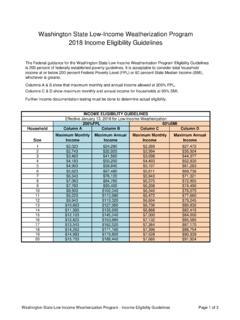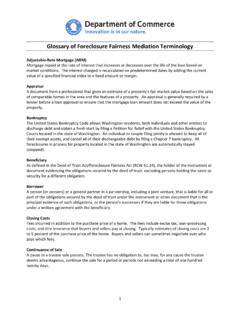Transcription of Financial Fraud and Identity Theft Investigation and ...
1 Financial Fraud and Identity Theft Investigation and prosecution Program Progress Report on Task Force and Recommendations (RCW ). December 2016. Report to the Legislature Brian Bonlender, Director Acknowledgements Washington State Department of Commerce Diane Klontz, Assistant Director, Community Services and Housing Division Richard Torrance, Managing Director, Office of Crime Victims Advocacy J. Harvey Queen, Financial Fraud and Identity Theft Program Manager and Report Writer Greater Puget Sound Financial Fraud and Identity Theft Task Force Melinda J. Young, King County Prosecutor's Office, Task Force Chair Spokane County Financial Fraud and Identity Theft Task Force Captain John Nowels, Spokane County Sheriff's Office, Task Force Chair Richard Torrance, 360-725-2905.
2 Washington State Department of Commerce Office of Crime Victim Advocacy 1011 Plum St. SE. Box 42525. Olympia, WA 98504-2525. For people with disabilities, this report is available on request in other formats. To submit a request, please call 360-725-4000 (TTY 360-586-0772). Financial Fraud and Identity Theft Crime Investigation and prosecution Table of Contents EXECUTIVE SUMMARY ..1. TASK FORCE PROGRAM Financial Fraud AND Identity Theft PROGRAM SURCHARGE TRANSFERS ..4. Financial Fraud AND Identity Theft TASK FORCE PROGRAM PERFORMANCE ..5. APPENDIX A: TASK FORCE ACTIVITIES AND RECOMMENDATIONS ..7. GREATER PUGET SOUND TASK SPOKANE TASK Financial Fraud and Identity Theft Crime Investigation and prosecution Executive Summary Overview The Financial Fraud and Identity Theft Crime Investigation and prosecution Program (FFIT), administered by the Department of Commerce (Commerce), has brought together state, county, and local law enforcement with Financial industry investigators to reduce Financial Fraud and Identity Theft in Washington state since the program's inception in 2008.
3 Financial Fraud and Identity Theft crimes are defined in RCW as check Fraud , chronic unlawful issuance of bank checks, embezzlement, credit/debit card Fraud , Identity Theft , forgery, counterfeit instruments (such as checks or documents), organized counterfeit check rings, and organized identification Theft rings. This report meets the statutory requirements for an annual FFIT progress report to the Legislature. In 2008, Commerce established two regional FFIT task forces consisting of the three largest counties in the state. The Greater Puget Sound (GPS) FFIT Task Force, which includes King and Pierce counties, and the Spokane County FFIT Task Force, are each comprised of representatives of: Local law enforcement.
4 County prosecutors. The state Office of the Attorney General. Financial institutions. Other state, local, and federal law enforcement and investigative agencies. At the end of the State Fiscal Year (SFY) 2015, Snohomish County joined the Greater Puget Sound (GPS) Task Force and began working as part of that group beginning of January 2016. The GPS Task Force focuses on large, complex, multi-jurisdictional environments with cases involving multiple suspects and large Financial organizations. The Spokane County Task Force operates in a smaller metropolitan area with fewer Financial institutions. Both task forces direct grant funds to law enforcement Investigation and forensic analysis, as well as to prosecutorial staff dedicated to Financial Fraud and Identity Theft cases generated by the investigations.
5 The task forces strengthen cooperation between Financial institutions and local law enforcement agencies to increase the capacity to respond to Financial Fraud and Identity Theft crimes. The FFIT program is funded entirely through the collection of fees self-imposed by the business community on Uniform Commercial Code (UCC) filings statewide. UCC filings are collected and deposited to the FFIT account by the state Department of Licensing (DOL). SB1090, passed during the 2014-15 legislative session, increased the three categories of fees to $10 each per 1. Financial Fraud and Identity Theft Crime Investigation and prosecution 1. filing going forward. The increased fees support a program-wide expansion of FFIT Investigation and prosecution , and the inclusion of a new partner in the GPS Task Force.
6 The fees that fund the FFIT program were extended from the original expiration date of July 1, 2015 to July 1, 2020. Key Findings2. There were 814 investigations conducted between July 1, 2015 and June 30, 2016, 15. fewer than in the previous state fiscal year period. The task forces charged the same number of cases (757) for 712 more counts than the previous year, for a total of 2,944 counts. There were 778 convictions, a 54 percent increase, or 272 more convictions, over the previous year. The task forces report performance quarterly to Commerce. In their six full contract years of active investigative operations (SFY 2011 through SFY 2016), the task forces have conducted 4,268 investigations, resulting in 3,509 cases that produced 10,361.
7 Charges, with 2,804 convictions. Figure 1: Statewide FFIT Performance for SFY 2011-SFY 2016. 3500. 3000. 2500. 2000. 1500. 1000. 500. 0. 2011 2012 2013 2014 2015 2016. INVESTIGATIONS CASES CHG'D COUNTS CHG'D CONVICTIONS. Source: FFIT Task Force Quarterly Reports 2. Commerce found inconsistencies in the task forces' previous reporting of data. We conducted an intensive technical assistance effort to find and fix the causes of data inconsistencies. This work yielded accurate data for the past six fiscal years, which is reflected in the figures and tables in this report. Financial Fraud and Identity Theft Crime Investigation and prosecution 2. Recommendations Commerce recommends that the Legislature consider the following task forces'.
8 Recommendations, which were developed with input from appropriate stakeholders, including representatives from the Financial institutions industry, the Washington Association of Sheriffs and Police Chiefs, and the Washington Association of Prosecuting Attorneys. The recommendations are further discussed in each task force's summary of activities and recommendations in the Task Force Program Outcome section. Task Force Recommendations The task forces submitted the following recommendations to Commerce (Appendix A), based on their experience investigating and prosecuting Financial Fraud and Identity Theft crimes: Elevate Identity Theft that is not financially motivated (under $1,500) to a first degree charge rather than the current charge of Identity Theft in the Second Degree under RCW.
9 Make possession of a skimming device with criminal intent to commit Identity Theft a felony under RCW Use of a stolen credit card ( Identity Theft in the Second Degree under RCW ). should be more heavily weighted for charges and prosecution than the charge for using a stolen Identity to open up new accounts, loans, or both, which is a rarer occurrence. 3. Financial Fraud and Identity Theft Crime Investigation and prosecution 3. Task Force Program Outcomes Financial Fraud and Identity Theft Program Surcharge Transfers Funds are collected by the Department of Licensing (DOL) from surcharges on personal and corporate Uniform Commercial Code-1 (UCC) filings.
10 DOL transfers collections monthly to Commerce for exclusive support of the activities of the Financial Fraud and Identity Theft (FFIT). program. Figure 2: Uniform Commercial Code-1 Collections From 2008 Through 2015. 1000000. 800000. 600000. 400000. 200000. 0. 2008 2009 2010 2011 2012 2013 2014 2015 2016. Number of Filngs Filing Surcharge Source: DOL Monthly UCC-1 Surcharge Reports UCC-1 collections began in August 2008, providing five months of surcharges for the 2008. calendar year. The FFIT program had three UCC surcharge fees: $8 for paper filings; $3 for individual web-based filings; and $3 for batch web-based filings. The program saved collections for a year in order to fund the task forces, which spend the first two years in organizing, hiring, and training staff before becoming operational.
